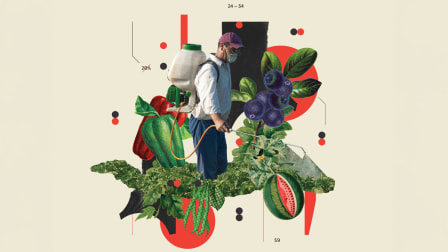From Our President: The Pesticides in Our Produce

For decades, consumer advocates have worked to improve the safety of our food, from making sure products list all ingredients on their labels to helping ban the use of toxic chemicals in agriculture. But potentially dangerous pesticides are still being found in our produce, which shows that our food safety system can—and should—get tougher.
A nationally representative CR survey of 2,068 US adults from January 2024 shows that 67 percent of Americans are very or somewhat concerned about pesticides in fruits and vegetables.
That fear is understandable: Some studies link long-term pesticide exposure to several health problems, including an increased risk of cardiovascular disease in adults and attention-deficit/hyperactivity disorder in children. In 2020, CR examined five years of government data on pesticides in produce. We found that about 20 percent of the fruits and vegetables we studied had very concerning amounts of these chemicals. In this issue, you’ll find our update on that analysis, highlighting the restricted pesticides that are still being found on certain foods.
The good news is you can reduce your exposure to pesticides by using our “Produce Without Pesticides” guide to choosing produce with lower levels of toxins by purchasing organic fruits and vegetables (which have less, but not zero, pesticides), and by washing your produce in cold running water for 15 to 20 seconds.
We believe that the burden to avoid pesticide-laden produce shouldn’t fall only on consumers. We need stronger oversight. While government agencies do regulate and test for pesticides, they’re still allowing high levels that could prove dangerous for our future health. CR is working with you to raise the bar on food safety because consumers deserve a system that holds our food to the highest standards and our health in the highest regard.
Editor’s Note: This article also appeared in the May/June 2024 issue of Consumer Reports magazine.




















